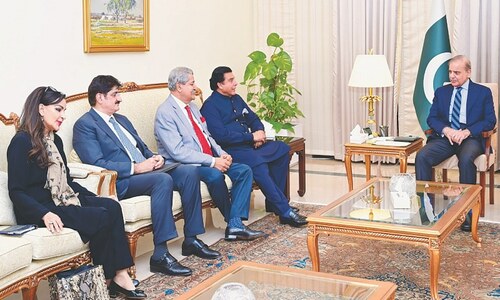TEHRAN, Nov 20: Iran on Sunday refrained from a complete rejection of the western overtures for a dialogue over Iraq, indicated that it would wait a little more before reacting categorically this way or that way but demanded a change in “American behaviour”.
Asked by Dawn for his reaction to British Prime Minister Tony Blair’s offer of “a special association” with Iran and Syria on the Iraqi situation, Iranian Foreign Minister Manouchehr Mutakki said talking to Britain was no problem because diplomatic channels between Tehran and London were open. But the United States, he insisted, must change its policies and behaviour not just in Iraq but in the Middle East on the whole before Iran could respond positively.
The foreign minister did not try to hide the fact that he was thoroughly enjoying the American plight in Iraq and Afghanistan, especially in the former, and did not seem to believe it was Iran’s duty to pull America’s chestnuts out of the fire. Iran, he said, was prepared to talk to everyone, except the Zionists. If the US were serious about talks with Tehran, then it must come up with some concrete proposals. But before that there must be some change for the better in American policies.
Mr Blair had qualified his offer to Syria and Iran with a warning that they must give up their alleged support to terrorism, and Tehran must abide by its international commitment on the nuclear question or else face isolation. Mr Mutakki wondered why Iran was accused of supporting terrorism because of its links with Hezbollah while Saudi Arabia had supported both Hamas and Islamic Jihad but was spared the terrorism charge.
Mr Mutakki said nearly four years after President Bush had said that all major combat in Iraq had come to an end, the Iraqi scene was dominated by terrorism and the continuation of occupation of the country by the
United States, with civilian casualties having reached the 600,000-figure. This was all because of “unilateralism”. If peace had to come to the region, he said, it was the regional states which would decide how to give peace to the region and not the United States. Here he emphasised the need for closer cooperation between Pakistan and Iran in all fields.
Tehran’s stand was, he said, that the US must withdraw from Iraq and let the Iraqi people rule themselves. There was no Shia-Sunni problem in Iraq before the American invasion, and it was America whose policies had led to the kind of situation we found in that country today.
In an hour-long talk with a group of Pakistani media team at the Iranian Foreign Ministry, the minister dealt at length with a number of issues, including his country’s relations with Pakistan, Kashmir, the OIC, and the nuclear question and insisted on his country’s right to nuclear technology. The Iranian position was “simple”: it was a signatory to the non-proliferation treaty and for that reason he demanded “our rights as an NPT signatory”, because Iran’s nuclear plans were transparent.
He said the utility of nuclear weapons in modern wars was doubtful. The fate of the Soviet army in Afghanistan and what happened recently in Lebanon to Israel, which possessed no less than 200 nuclear warheads, had clearly proved that weapons of mass destruction were of no use to anyone. For that reason, Iran’s nuclear plans, he said, were transparent and were for peaceful purposes.
Asked why Iran needed nuclear technology when it had oil and gas in plenty, Mr Mutakki said Iran’s oil and gas resources were not inexhaustible. Besides, the use of nuclear technology was not confined to energy alone but was needed in other sectors of the economy. The United States, he said, had huge oil and gas reserves but it still possessed nuclear technology and a stockpile of nuclear weapons.
He seemed hurt when a TV man told him that Iran’s opposition to the US seemed a little unreal because behind the scenes Tehran was helping the US consolidate the Shia-led Iraqi government. Mr Mutakki said there had been no change in Iranian policy toward the US. Iran had condemned the American invasion of Iraq from day one, it had opposed the American attack on Afghanistan tooth and nail, and it had consistently resisted Washington’s policies toward Lebanon and Palestine and the reign in general. Global problems, he said, needed a global solution and not unilateral solutions.
On Kashmir, he “congratulated” Pakistan and India for pursuing a process of normalisation and said the issue could be solved by peaceful means. To develop their economic potential, he said, Pakistan and India needed peace.
He pleaded for greater cooperation between Pakistan and Iran, and said there was no other country in the region to which Tehran attached so much importance in seeking solutions to regional problems.














































Dear visitor, the comments section is undergoing an overhaul and will return soon.